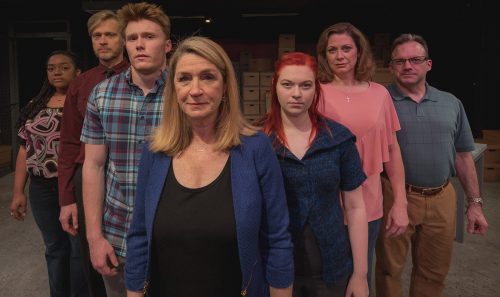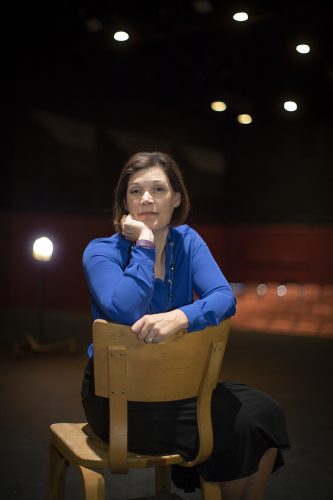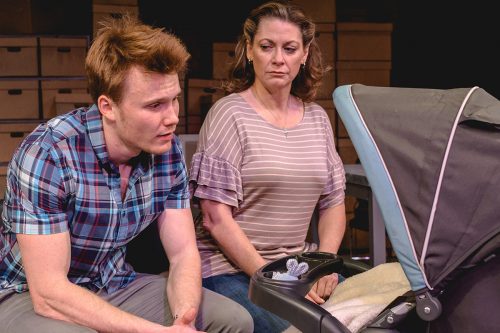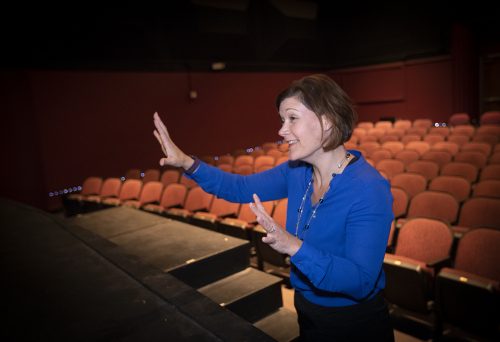Students Gain Experience Through Community Theater
Collaborations set the stage for TCU actors’ careers.
Students Gain Experience Through Community Theater
Collaborations set the stage for TCU actors’ careers.
As the stage lights rise up, the audience sitting feet away from the actors in the intimate Circle Theatre prepares to watch a new story unfold.
Ashlee Waldbauer, a junior musical theatre major, darts across the stage with a frantic energy. Her character, 19-year-old Karlie, is at the hospital with her infant daughter, Luna Gale. The young mother is high on meth.

Cast photo from Circle Theatre’s April 2018 production of Luna Gale. Shown, left to right: TCU theatre major Rachel Poole (Lourdes), Ken Orman (Cliff), TCU theatre major Thomas “Quinn” Moran (Peter), Lisa Fairchild (Caroline), TCU theatre major Ashlee Waldbauer (Karlie), TCU associate professor of theatre Krista Scott (Cindy) and Jakie Cabe (Pastor Jay). Courtesy of Circle Theatre | Photo by Circle Theatre executive director Tim Long
Karlie’s boyfriend Peter (played by Thomas “Quinn” Moran, a junior musical theatre major) is hunched over and groaning. No matter how hard his girlfriend shakes him, he remains motionless.
Soon Karlie and her mother are battling each other for custody of Luna Gale.
Circle Theatre, a 125-seat theater in Fort Worth, produced Luna Gale with TCU’s Theatre Department for three weeks in Spring 2018. The department teams with local theaters to provide professional exposure for its students.
Krista Scott, associate professor of theatre, said the experience is invaluable for students. “It gets them seen in the professional arena,” said Scott, who directed The Heir Apparent, which TCU produced with Stage West, a 150-seat theater in Fort Worth, in 2015.
Matthew Gray, artistic director at Circle Theatre, said working with TCU benefits his theater because of split production costs and shared resources such as props and set pieces.
Circle Theatre’s staging of Luna Gale was the North Texas premiere of the play, which opened at Goodman Theatre in Chicago in 2014.
Gray said the theatrical company and the university share one other thing: trained actors.
Scott, who portrays Karlie’s mother in Luna Gale, said TCU students are just as disciplined as the seasoned professionals. She said the students had no trouble transitioning from college actors to working at the professional level.
“It was seamless,” Scott said. “There was no difference, really, in process in rehearsal with the students and when we were rehearsing with just the professionals. They held their own and do hold their own in the play.”
Matter of Perspective
Community theater is often undervalued compared with large-scale productions on New York City’s Broadway.

Jennifer Engler, associate professor of theatre, directed Luna Gale, a production about an evolving custody battle. Photo by Joyce Marshall
Jennifer Engler, associate professor of theatre, said local shows offer a perspective that large-scale productions can’t provide. The professor, who also directed Luna Gale, said local theaters keep performances from becoming too “cookie-cutter.”
Gray said smaller shows offer a more intimate, community experience that doesn’t break the bank, and his goal is to make theater accessible to more people. A ticket to Luna Gale was $25-$38.
In a June 2017 article, The New York Times reported that the average ticket price for a Broadway show was $109. At Dallas’ Music Hall at Fair Park, a seat close to the stage costs more than $100.
Jeffrey Schmidt, artistic director of Theatre Three in Dallas, said keeping productions affordable is important to his company. Local theater, he said, allows audience members to connect with a story and provides a communal experience.
“We’re here to reflect the lives of the people in this area so they get to see stories about themselves,” Schmidt said. “The stories that we tell and share are universal and resonate with just about anyone in the community.”
Turning Pro
Rehearsals for Luna Gale, Waldbauer’s first professional theater credit in Fort Worth after debuting in Portland, Oregon, were more fast-paced than for a TCU-only production.
For one thing, actors must start rehearsing with all their lines memorized. But she liked the change because it allowed actors to dig deeper into their characters.
The play ran for three weeks, with four performances each week. At TCU, plays have a seven-performance run in a single week.
With a longer run, student actors must maintain a strong performance for a greater amount of time. Waldbauer said the professional challenge gave her an opportunity to experiment with her character as well as play off each audience’s reactions.
Waldbauer said she needed the time off during the week because of the emotional demands of her role, but she wanted the challenge because it helped her grow as an actor.
Building Character
To build Karlie’s personality for Luna Gale, Waldbauer worked with Engler, who allowed the actors the freedom to play with their characters, such as building backstories based on context clues in the script.

TCU student Quinn Moran as Peter perfects his role as a young drug-addicted father in a scene with Krista Scott, associate professor of theatre. Courtesy of Circle Theatre | photo by Circle Theatre executive director Tim Long
Waldbauer and Moran said they worked together to understand the history of their characters’ relationship. Figuring out the small details might not be important to the audience, but the actors’ understanding of it plays out onstage, Moran said.
“It just makes you so much more connected to the other characters,” he said. “I think it works better than just saying the lines on the page.”
For the Luna Gale production, Engler said she paid special attention to what happened in the story between scenes that wasn’t shown onstage. The play runs two hours, but the plot takes place across three months.
The actors needed to understand the time element and relate it to how their character felt in the staged part of the story, Engler said. For Waldbauer and Moran, this meant considering how long it had been since their characters last saw their young daughter.
With its long gaps in time, the play, written by Rebecca Gilman, had a cinematic quality, Engler said. This filmlike sensibility led the director to underscore the play with music, but she avoided tunes the audience would recognize.

Jennifer Engler encouraged the actors — TCU students and professionals — to make up backstories for their characters. Photo by Joyce Marshall
Engler asked Parker Greenwood, a freshman musical theatre major at the time, for help since he had original piano pieces in his online portfolio. In a seven-week period, Greenwood composed music for Luna Gale, writing short pieces to play between scenes. He said the music conveyed a theme of “fighting against a lack of hope.”
Rachel Poole, a sophomore musical theatre major, also used music backstage to help with her character, a foster child who undergoes a major transition between Luna Gale’s two acts.
Poole had a different playlist for each act to generate the right mood. The first playlist included cheerful music, such as the Plain White T’s hit “Hey There Delilah.” For the second act, Poole said she listened to fierce, new-age rap artists, such as Migos and ASAP Mob.
Moving an Audience
Garret Storms, associate producer at Stage West, said local theater provides an audience access to various portrayals of the human condition.
“It’s living, breathing in the room with you,” Storms said. “Each show is a once-in-a-lifetime thing you can never re-create.”
For Engler, theater shows people who they are and what they have the power to become. Luna Gale makes the audience examine that reflection, she said. It asks the audience to consider each character’s value in relation to that character’s journey.
Engler said the most hopeless character in the beginning (Moran’s Peter) becomes the saving grace in the end. “Don’t write anybody off,” she said. “Because if we write off that kid [who] seems completely useless over there, we may have written off our best hope for the future.”
Scott said everything in life relates back to stories, which is why live theater is a powerful medium for understanding the human condition.
“Our way into human empathy is to understand somebody’s story. Theater gives us that way of finding empathy,” Scott said, “letting ourselves imagine another person’s experience through that story, hopefully making our experience that much richer and understand ourselves better because we understand other people better.”
As Luna Gale unfolds, each character’s point of view on the custody battle is revealed. But Gray said the playwright intentionally doesn’t make it clear whom the audience should root for.
Plays that cause the audience to question moral values are timeless, he said. “These kind of big moral questions that I think just kind of go to the heart of the human condition, those questions are never going to get old.”

Your comments are welcome
1 Comment
The term “community theatre” is mid-used in the headline and the text of this article. “Community theatre” is a label given to amateur theatre companies, where very few if any participants are paid. It’s certainly not a pejorative term, but it identifies a theatre as a collection of artists who are creating theatre for love alone, rather than money (which is incidentally, what “amateur” means). However Circle Theatre and Stage West are professional theatres, where most everyone is paid, some of them under professional union contracts, and where people are participating in theatre as a vocation, rather than an avocation. This is an important distinction; TCU’s Theatre Department offers collaborations to our students with the highest professional experience.
Related reading:
Features
‘Come From Away’ Inspiration Beverley Bass Tells Her Story
An American Airlines pilot got diverted on 9/11, and her story has landed on Broadway.
Alumni
Johnny Simons: the force that lights up Hip Pocket Theatre
Backwoods bard mixes the creative and the chaotic at his theatre.
Alumni
Tina Mullone Choreographs a Dance Career
MFA grad never stops moving as she leaps from ballet to modern to more